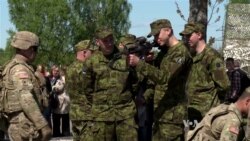Political analysts say a vote in favor of Britain leaving the European Union would raise concerns among the former Soviet states in the Baltics and eastern Europe that are now EU members and neighbor a resurgent Russia.
If British voters decide in a June 23 referendum to leave the EU, a so-called "Brexit," former Soviet states Estonia, Latvia and Lithuania would have good reason to question European unity, says the director of the Russian Academy of Sciences’ Institute of Europe, Alexey Gromyko.
"I think for the Baltic states and for Poland it would be much more difficult to press forward with this staunch opposition to any kind of easing in relations with Russia," he tells VOA’s Moscow bureau.
After Crimea, the Baltics?
Russia's annexation of Crimea and aggression in east Ukraine, ostensibly to save ethnic Russians against what the Kremlin paints as fascist Ukrainians, stoke fear among some in the Baltics they could be next.
Significant populations of ethnic Russians moved to the Baltic states during the Soviet era. About one-third of the people in Latvia are Russian.
Very few expect Russia would attempt an attack on any Baltic states, as the majority of people there have no interest in reuniting with Russia over the European Union.
Outside a British-style pub in Moscow, Latvian tourist Klaus Ristaposhin told VOA he hopes the British vote to stay in the European Union.
"I don't think England should leave the European Union," he said in Russian, "because it is a very dear country for us all. Europe could suffer serious damage if England exits the European Union," he added.
Implications for NATO
Baltic states are also members of the NATO military defense alliance. An attack on one member is considered an attack against all 28 NATO members and would require retaliation.
Nonetheless, a NATO build-up in the region for deterring Russia could see side-by-side growth in national defense, said the director of the Political Capital Institute in Budapest, Peter Kreko, via Skype.
"I think even the NATO cooperation would deeply suffer in a Brexit and its negative political and economic, consequences," he said. "So, I do think a lot of countries would begin to spend more on military and defense."
While other analysts argue NATO would not be affected, U.S.-EU unity against a resurgent Russia could still wane.
"Great Britain always was considered as the most pro-American party inside the Union," said the Carnegie Moscow Center’s Alexander Baunov.
"And, the Baltic States and Poland, and some other eastern European countries are interested in more American influence in the European politics, not in less," he added.
There would be some advantages for Moscow not having Britain’s criticism of Russian policy heard in the European Union, acknowledges Gromyko.
"But...all these things," he says, "no matter from what capital, from what European capital, you look at them, are tactical. They do not help Moscow, Riga or Tallinn, or Vilnius or London to solve any substantial regional or global problems," said Gromyko.
"And, keeping in mind that the European Union, in spite of two years of the sanction war, is the leading trading partner of Russia," he said, "I do not think that it is in Russian strategic interest to have any developments [that] may lead to further stagnation in the economy of the member states of the European Union."
Expressing confidence in the NATO alliance, Estonia's leaders in May told VOA's Russian service that any military action by Moscow would be foolish.
They expressed faith also in the European Union overcoming its many challenges, including Russian aggression and a possible Brexit.
"We have had to deal with more complicated issues in the course of history," Estonia’s foreign minister and former ambassador to Moscow Marina Kaljurand told VOA’s Yulia Savchenko in an exclusive interview. "So Europe will emerge more consolidated, stronger, and more self-assured," she concluded.






